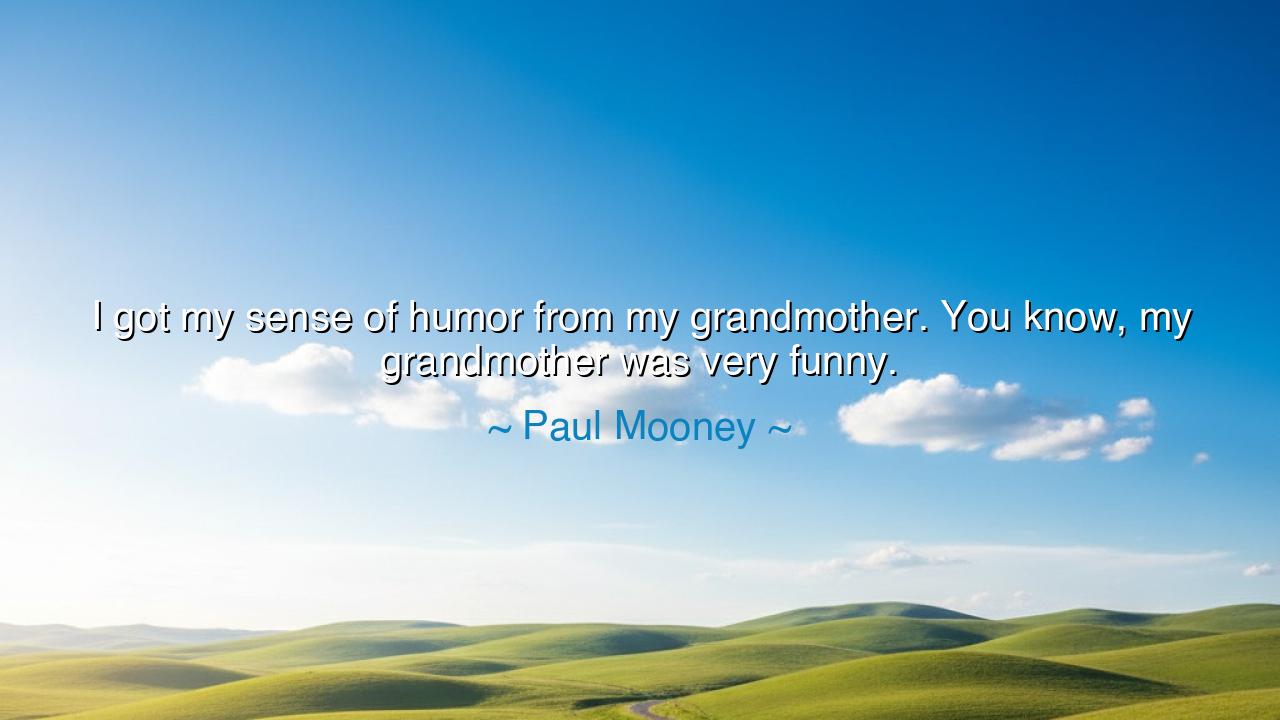
I got my sense of humor from my grandmother. You know, my






In the great flow of time, where the lessons of the ancients meet the living hearts of today, there is a truth that resounds through every generation—the gift of humor. It is a force as old as humanity itself, one that has the power to heal, to unite, and to transcend the mundane. When Paul Mooney spoke of his grandmother, saying, "I got my sense of humor from my grandmother. You know, my grandmother was very funny," he revealed a deep truth about the inheritance of wisdom and joy—that humor is often passed down through generations, a thread that connects us to our ancestors, binding the past with the present and teaching us the deepest lessons in the lightest of ways.
The ancient world, too, recognized that humor is not simply the province of the individual, but a collective treasure passed down through families, cultures, and ages. It is said that Socrates, the great philosopher, often used irony and humor to guide his disciples toward enlightenment. Yet his humor was not born of jest or mockery, but from a deep well of wisdom, drawn from the shared experiences of humanity. Just as Paul Mooney learned from his grandmother, Socrates' humor was steeped in the teachings of those who had come before him. It is this inheritance that makes humor so powerful: it is not just a tool for laughter, but a conduit for understanding, a way to communicate the deepest truths of life with grace.
The grandmother, a central figure in Mooney’s recollection, is no mere source of affection, but a vessel of wisdom, of life’s lessons passed on in subtle and sometimes humorous ways. In the same manner, the great mother of the Stoic tradition, Aurelius's reflections, reveals that the greatest lessons of life are often taught not through grand speeches, but through simple, humble observations of the world. Consider the countless stories told by mothers and grandmothers throughout history, whose humor and wisdom shaped the lives of generations. Mooney's grandmother, in her humor, was a reflection of this timeless tradition—a source of light, guiding him through the trials and joys of life with a laugh.
In the ancient world, stories of great teachers often involve the figures who shaped their disciples with not just words, but with the subtle lessons of daily life. Take, for example, the great Confucius, whose teachings were not solely based on doctrine, but on the small, everyday moments that reveal the truth about human nature. It was in the simple interactions, the gentle guidance, that the greatest lessons of life were imparted. Similarly, Paul Mooney’s grandmother, through her humor, passed down the wisdom of her own experiences, allowing him to find strength in the laughter that came from the truth of those experiences. Humor, like wisdom, is often learned in the most unassuming of ways—passed down through gestures, through stories, through the unspoken moments that linger in our hearts.
The lesson of Mooney’s reflection is clear: the humor we inherit is not random or trivial. It is a legacy, a gift from those who came before us. Just as Socrates learned from the sages before him, and Aurelius reflected on the teachings of those who had passed, so too does Mooney carry forward the humor and wisdom imparted to him by his grandmother. It is a reminder that the laughter we share is not just for amusement—it is an expression of the shared human experience, of the love, struggle, and joy that have passed down through the generations. Humor, in this light, becomes a sacred bridge, connecting past, present, and future.
We must look to this example and remember that the humor we carry with us is part of a larger tapestry, woven from the stories of those who raised us. In our own lives, we must honor those who have passed on their humor to us, recognizing that it is not merely a source of entertainment, but a tool for growth and understanding. The laughter we share with others, whether it be with a grandparent, a friend, or a stranger, is a reflection of the lessons we have learned and the wisdom we continue to pass down. Humor, after all, is more than a response—it is a way of being, of seeing the world with both clarity and joy.
So, let us embrace the gift of humor passed down from those who came before us. Let us laugh not only for its own sake but for the lessons it imparts, for the connections it fosters, and for the joy it brings into the world. Like Paul Mooney’s grandmother, whose humor shaped his path, we too can offer our humor to the next generation, not as a tool for distraction, but as a means of teaching, of connecting, and of lifting the spirits of those we love. In this way, we carry forward the wisdom of the past, one laugh at a time.






AAdministratorAdministrator
Welcome, honored guests. Please leave a comment, we will respond soon